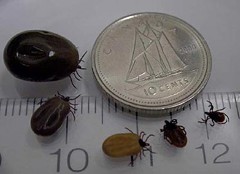A black-legged tick found locally has tested positive for the bacteria that can cause Lyme
disease.
Public Health Sudbury & Districts states in a release it is the first positive tick report within the Sudbury
and Manitoulin districts this year.
The health unit reminds the public to take precautions to protect themselves since Lyme disease can
have long-lasting, debilitating effects on people’s health.
For more information on protection and detection, visit the health unit website.
What to look for:
· avoid walking in tall grass and make sure yards are kept clear of debris and overgrown
vegetation, grass, bushes, and trees
· keep woodpiles and bird feeders away from homes
· wear a long-sleeved, light-coloured shirt, pants, and closed-toe shoes
· use insect repellents that are federally regulated and contain DEET, and follow the
manufacturer’s instructions for their safe use
· check your clothing, body, and pets for ticks and change your clothing upon returning home
from the outdoors
· take a shower to help wash off ticks that have not yet attached themselves to the skin
· If you find a tick attached to a human
· If a tick is found embedded in the skin, use tweezers to remove it as soon as possible.
· Use fine-tipped tweezers to grab the tick close to the skin and gently pull straight up.
· Wash the area with soap and water.
Put the tick in a dry container and bring it to your local public health unit to be sent for identification
and testing for Lyme disease.
Follow up with your health care provider to determine if you need treatment, especially if the tick has
been attached for more than 24 hours.
One of the typical signs of Lyme disease is a rash that looks like a bull’s eye: the bite area is surrounded
by a round, red rash. Other symptoms of the disease can include fever, headache, and muscle and joint
pain. If left untreated, Lyme disease can cause serious problems to the heart, joints, and nervous
system. Lyme disease is treated with antibiotics.
For more information on Lyme disease and ticks, call Public Health Sudbury & Districts at 705.522.9200,
ext. 464 (toll-free 1.866.522.9200) or visit www.phsd.ca.


